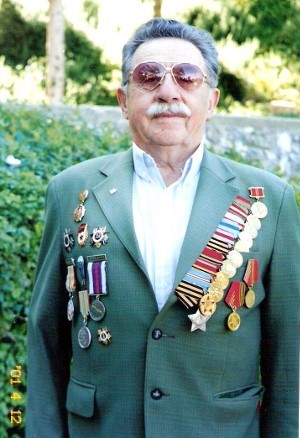Iakov Sibiriakov was born as Iakov Shvartsburd in 1926 in the town of Pikov, near Vinnitsa, in southwestern Ukraine. From the late 1920s, the family lived in a nearby Ukrainian village, where Iakov's father worked at a sugar factory. Iakov's sister Hene married a Ukrainian – the military political commissar Ivan Prudkii, who was serving in a regiment stationed in the nearby town of Khmelnik.
With the beginning of the German-Soviet, Hene returned to her parents with her baby Arkadii. Several days later, bearded and dirty, Prudkii appeared at their home and said that the Germans would be there soon, and that he had only half a day during which to evacuate the Shvartsburd family eastward, to Central Ukraine, where his parents were living. That was how Iakov reached the village of Shabelniki, 250 kilometers southeast of Kiev.[1] The rescue, however, turned out to be only temporary because in September 1941, Italians forces entered the village in September 1941, and they were soon replaced by German occupiers.
The Germans organized a registration of all the local residents. Hene, who was taken for a Ukrainian in the village, advised Iakov to register as a Russian named Iakov Sibiriakov, the name of a Russian officer, a friend of her husband who had been killed during the first days of the war. Nevertheless, later a Ukrainian policeman came to Ivan Prudkii's father (also named Ivan) and told him that his daughter-in-law and her brother had to report to the commandant's office since someone had denounced them to the Germans as Jews. Since her son was not circumcised and she had blond hair, Hene believed that she would pass as a Ukrainian. Ivan Prudkii-senior said to Iakov: "Tell the village lads that you have found your uncle in [the city of] Cherkassy and are going there to live with him." Hene's father-in-law then prepared a shelter in his barn and hid the boy there. Iakov lived in this bunk from November 1941 to December 1943, being taken into the house only during the most severe winter frosts.
On one early morning in December 1943, Prudkii-senior opened the bunker and called out to Iakov: "You can get out of the pit now! Our forces have arrived!" Two days later after his liberation, accompanied by Hene, Iakov went to the recruitment office at a nearby town to volunteer for the Red Army. Iakov recalled how that took place:
"Some rifle army unit was still located in [the town of] Chyhyryn. Among the officers we saw one senior lieutenant who looked like a Jew. Since in fact he was Jewish, we approached him and took him aside. In several sentences, my sister told him everything that had happened to me during the occupation. I asked him only one question, what should I do next, i.e., what name should I give at the military enlistment office, Shvartsburd or Sibiriakov?
The lieutenant replied: 'After the war, you can sort it all out, but for now, remain the Russian Sibiriakov. All around you will be Ukrainians from the occupied areas. They can shoot you in the back during combat and that will be the end of ... It is better not to take chances.' At the military enlistment office, they asked 'Who is this? A volunteer? Excellent! -…welcome!' There were no medical examination, no checking of anything, and no further questions.
I looked really terrible at this time: a skeleton probably looked better and healthier than I did".[2]
In January 1944, the new draftee Private Iakov Sibiriakov was sent to a training camp for air-landing troops to learn to be a paratrooper. In June, Corporal Sibiriakov was assigned to the 25th Parachute Brigade. Ironically, although Sibiriakov had completed a long training course that involved his learning to use a parachute, he never used this skill in combat. In the fall of 1944, his unit was transferred to Hungary, where he served as a sapper. In April 1945, Sibiriakov prevented a strategically important bridge over the Donaukanal (the Danube Canal) in Vienna from being blown up by the enemy. For this feat he was awarded the Order of the Red Banner. He ended the war in the Austrian Alps in May 1945. Unfortunately, he was wounded, for the first time, on May, 10, two days after the capitulation of the Wehrmacht. His right hand had to be amputated.
After the war Iakov Sibiriakov lived in Dnepropetrovsk (now Dnipro, in Ukraine), then in nearby Dneprodzerzhinsk (now Kamianske). He worked as an administrator. In 1990, he emigrated and settled in Israel.
Iakov's elder brother Mikhail Shvartsburd was born in 1919, served in the Red Army tank forces from before the Soviet-German war. During the war he was a tankman and was wounded several times. After the war he was promoted to the rank of captain. He tried to find members of his family, but learned that none of them survived the German occupation. In 1947, Mikhail succeeded in leaving the Soviet Union and reaching the Land of Israel. According to the interview that Iakov gave in 2013, the sending of a number of young Jewish officers of the Soviet Army to the Palestine was a clandestine initiative of the Soviet government and his brother Mikhail was one of those officers. Iakov stated that Mikhail took part as a tankman in the Israeli War of Independence (the 1948 Arab-Israeli War) and adopted the name Moshe Ben-Ami. In 1990, the brothers met in Israel. Moshe Ben-Ami, a.k.a. Mikhail Shvartsburd, died in 1991.[3]
[1] The village of Shabelniki, which was located close to Chyhyryn, does not exist any more. It should not be confused with another village with the same name, located near the town of Zolotonosha.







